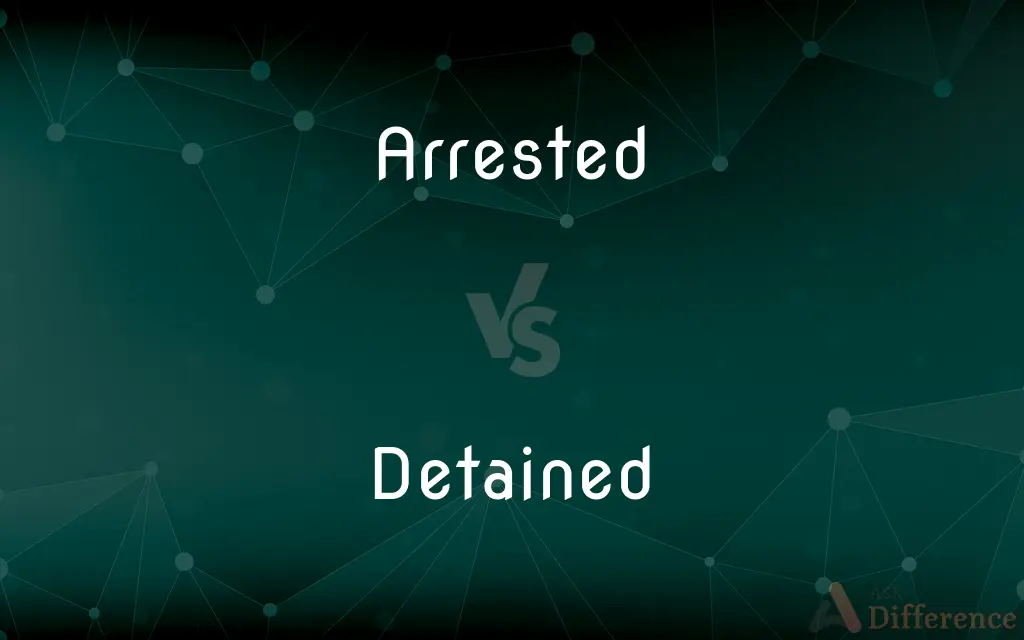Arrested vs. Detained — What's the Difference?
Edited by Tayyaba Rehman — By Urooj Arif — Updated on May 19, 2024
Arrested means being taken into legal custody due to suspected criminal activity, whereas detained refers to being held temporarily for questioning or investigation without formal charges.

Difference Between Arrested and Detained
Table of Contents
ADVERTISEMENT
Key Differences
Arrested implies that a person is taken into custody by law enforcement under suspicion of committing a crime. This typically involves being read Miranda rights and potentially being charged with a crime. Detained, on the other hand, means being held by authorities temporarily for questioning or investigation purposes but not necessarily under arrest.
Being arrested usually leads to formal charges and a more prolonged legal process. It involves being booked, which includes taking fingerprints and photographs, and can result in a criminal record. Detained, however, is often a shorter process, and the individual may be released without charges after a brief period if the authorities find no grounds for arrest.
An arrest typically requires probable cause, which is a higher standard of evidence that a crime has been committed. Detention only requires reasonable suspicion, a lower threshold that allows officers to hold someone briefly to investigate further. This means that detention is often used as a preliminary measure before deciding whether an arrest is warranted.
Individuals who are arrested are formally taken to a police station or jail, where their rights and legal processes are clearly defined. Those who are detained might be held at the scene or taken to a station, but their stay is not as structured, and they may not be given the same rights as an arrestee, such as a phone call or attorney access immediately.
Comparison Chart
Legal Implication
Taken into legal custody with charges
Temporarily held without formal charges
ADVERTISEMENT
Duration
Potentially longer, until bail or trial
Typically shorter, pending investigation
Rights
Miranda rights read, right to attorney
Limited rights, no guaranteed attorney
Evidence Requirement
Probable cause
Reasonable suspicion
Outcome
Leads to booking and possible criminal record
Release without charges or possible arrest
Compare with Definitions
Arrested
Taken into custody by law enforcement.
He was arrested for theft last night.
Detained
Short-term holding.
They were detained for a few hours.
Arrested
Involves legal procedures.
After being arrested, he was taken to the police station.
Detained
Held temporarily by authorities.
She was detained for questioning.
Arrested
Requires probable cause.
The police arrested him after finding evidence of a crime.
Detained
No formal charges.
He was detained but later released without charges.
Arrested
Subject to formal charges.
She was arrested and charged with fraud.
Detained
Preliminary investigation.
Passengers were detained at the airport for security checks.
Arrested
To stop; check
A brake that automatically arrests motion.
Arrested the growth of the tumor.
Detained
Based on reasonable suspicion.
The officers detained him due to suspicious behavior.
Arrested
To seize and hold under the authority of law.
Detained
To keep from proceeding; delay or retard
Our friends were detained by heavy traffic.
Arrested
To capture and hold briefly (the attention, for example); engage.
Detained
To keep in custody or confinement
The police detained several suspects for questioning.
Arrested
To undergo cardiac arrest
The patient arrested en route to the hospital.
Detained
(Archaic) To retain or withhold (payment or property, for example).
Arrested
The act of detaining in legal custody
The arrest of a criminal suspect.
Detained
Simple past tense and past participle of detain
Arrested
The state of being so detained
A suspect under arrest.
Arrested
A device for stopping motion, especially of a moving part.
Arrested
The act of stopping or the condition of being stopped.
Arrested
Simple past tense and past participle of arrest
Arrested
Having been stopped or prevented from developing; terminated prematurely.
Arrested
Having been placed under arrest, or having been charged with a crime.
Arrested
Having development checked or reversed;
Arrested tuberculosis
Arrested
Can result in criminal record.
Being arrested can have long-term consequences.
Common Curiosities
What does it mean to be detained?
Being held temporarily by authorities for questioning or investigation without formal charges.
Do you have rights when arrested?
Yes, you are typically read your Miranda rights, including the right to remain silent and to an attorney.
What leads to being detained?
Reasonable suspicion that warrants further investigation.
How long can you be held after arrest?
Until bail is posted or a court hearing is scheduled, which could be several hours to days.
What leads to an arrest?
Probable cause that a crime has been committed.
How long can you be detained?
Usually for a short period, but it varies depending on the situation and local laws.
Can you be detained at a traffic stop?
Yes, officers can detain you temporarily to investigate suspected violations.
What does it mean to be arrested?
Being taken into legal custody by law enforcement due to suspected criminal activity.
Do you have rights when detained?
Rights may be limited, and it varies by jurisdiction; you might not have immediate access to an attorney.
Does detention affect your record?
Detention itself does not result in a criminal record unless it leads to an arrest and charges.
Can you be detained without being arrested?
Yes, detention does not involve formal charges or custody like an arrest does.
Is being detained part of the legal process?
It can be a preliminary step in the legal process, but it is not always followed by an arrest.
Can detention lead to arrest?
Yes, if during detention sufficient evidence is found to justify an arrest.
What happens after being detained?
You may be released without charges, or it may lead to further questioning or arrest.
Is detention always related to criminal suspicion?
No, it can also occur for safety or administrative reasons, such as at airports or border checks.
Share Your Discovery

Previous Comparison
England vs. Scotland
Next Comparison
Cia vs. DiaAuthor Spotlight
Written by
Urooj ArifUrooj is a skilled content writer at Ask Difference, known for her exceptional ability to simplify complex topics into engaging and informative content. With a passion for research and a flair for clear, concise writing, she consistently delivers articles that resonate with our diverse audience.
Edited by
Tayyaba RehmanTayyaba Rehman is a distinguished writer, currently serving as a primary contributor to askdifference.com. As a researcher in semantics and etymology, Tayyaba's passion for the complexity of languages and their distinctions has found a perfect home on the platform. Tayyaba delves into the intricacies of language, distinguishing between commonly confused words and phrases, thereby providing clarity for readers worldwide.
















































